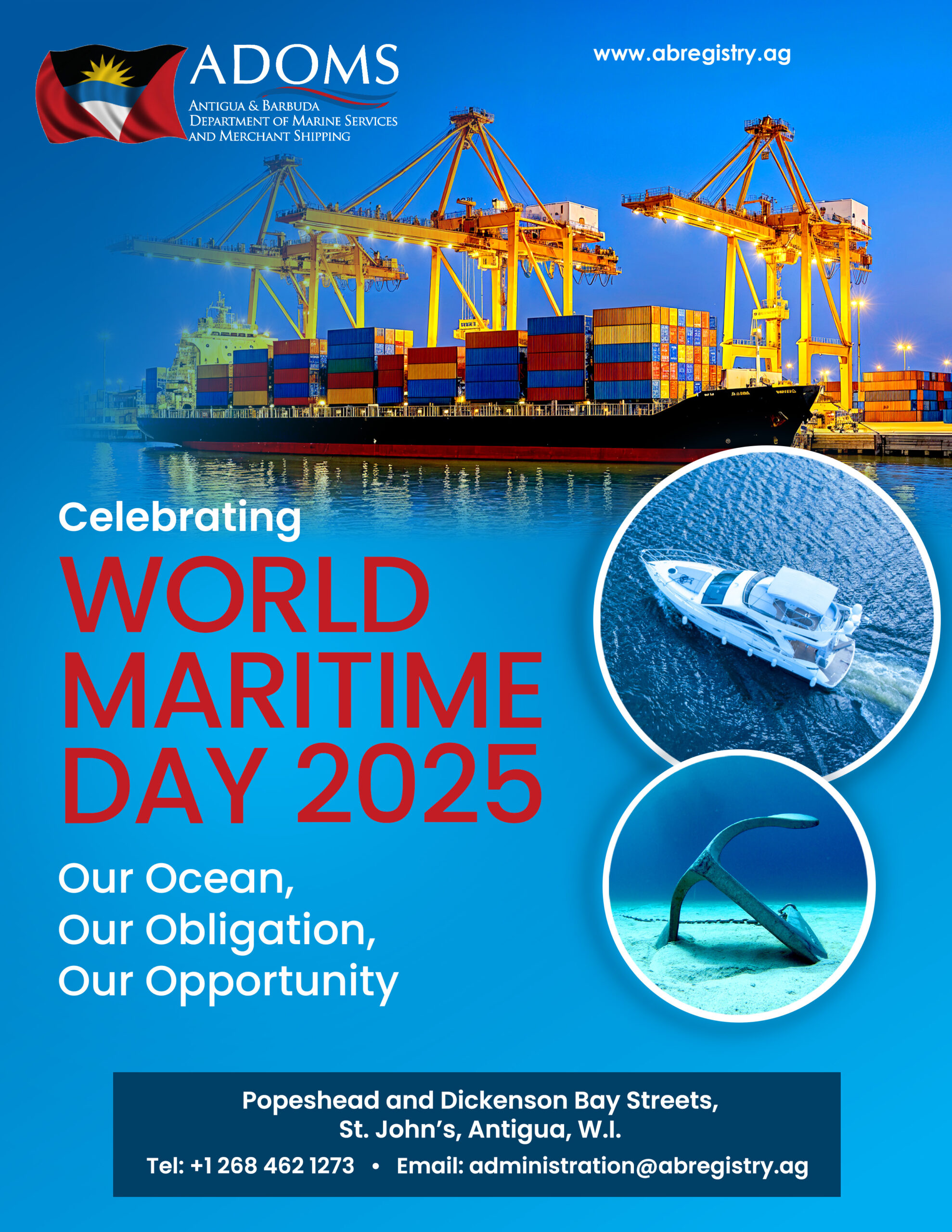As the world observes World Maritime Day on the last Thursday of September, the Department of Marine Services and Merchant Shipping (ADOMS) is shining a spotlight on Antigua and Barbuda’s role in regulating international shipping and shaping international ocean governance. This task is being undertaken with the mechanism established by the United Nations (UN) specialised agency with responsibility for the safety and security of shipping and the prevention of marine and atmospheric pollution from ships.
This year’s theme, designated by the International Maritime Organization (IMO), is “Our Ocean, Our Obligation, Our Opportunity”, a timely reminder of the pressing need to protect the marine environment amid rising global threats.
ADOMS through the Permanent Representative to the IMO remains committed to contributing to the safety and security of international shipping and the protection of the marine environment. Within this thematic and construct, ADOMS in collaboration with the Permanent Mission to the UN, has been playing a critical role in three major multilateral efforts in which Antigua and Barbuda is actively involved:
- The Agreement under the UN Convention on the Law of the Sea (UNCLOS) on the Conservation and Sustainable Use of Marine Biological Diversity of Areas Beyond National Jurisdiction (the BBNJ Agreement),
- The Global Plastics Treaty, and
- Ongoing IMO-led discussions on reducing greenhouse gas (GHG) emissions from ships.
SIDS at the Forefront
As a Small Island Developing State (SIDS), Antigua and Barbuda faces disproportionate risks from climate change including rising sea levels, stronger storms, and dwindling freshwater supplies. Despite contributing minimally to global emissions, SIDS must divert scarce resources to climate adaptation and recovery.
Antigua and Barbuda, together with fellow CARICOM members, has consistently advocated for equity and ambition in global climate negotiations and we continue to play a leadership role in crafting environmental treaties that reflect the unique vulnerabilities of island nations.
Protecting the High Seas: The BBNJ Agreement
Adopted in 2023 under UNCLOS, the BBNJ Agreement represents the first global treaty dedicated to conserving biodiversity in areas beyond national jurisdiction (ABNJ), including the high seas and the deep seabed. The ABNJ accounts for nearly half of the Earth’s surface but has historically suffered from fragmented governance.
Key pillars of the BBNJ Agreement include:
- Access and benefit-sharing of marine genetic resources (MGRs),
- Creation of marine protected areas (MPAs),
- Mandatory environmental impact assessments (EIAs), and
- Technology transfer and capacity-building for developing states.
Antigua and Barbuda has been at the vanguard of this initiative, becoming the 19th country to ratify the treaty. We also served as CARICOM’s representative on both the Bureau of the Intergovernmental Conference that negotiated the treaty and are currently on the Bureau of the ongoing Preparatory Commission that will oversee its implementation.
Tackling Plastic Pollution: The Global Plastics Treaty
Running in parallel is the development of a Global Plastics Treaty, initiated by the United Nations Environment Assembly (UNEA) in 2022. Unlike BBNJ’s focus on biodiversity, this treaty seeks to address plastic pollution across the entire lifecycle from production and design to disposal and leakage into the environment.
Plastic waste is now one of the most pervasive threats to the marine ecosystem, with microplastics found not only in near-shore marine life but also in deep-sea trenches. Antigua and Barbuda has been an outspoken advocate for the treaty from its inception, again serving as the CARICOM representative on the Bureau of the Intergovernmental Negotiating Committee.
Decarbonizing the Seas: IMO’s Push to Reduce Shipping Emissions
The third front in global ocean governance lies within the IMO, which has accelerated negotiations to tackle GHG emissions from international shipping, which accounts for around 3% of global emissions.
Through its Revised GHG Strategy (2023), the IMO aims to reach net-zero shipping emissions by 2050, with interim targets for 2030 and 2040. Measures under discussion include:
- Carbon intensity standards,
- Market-based tools like carbon pricing,
- Alternative fuel incentives, and
- Lifecycle GHG accounting.
Although climate-focused, the IMO’s work intersects with both the BBNJ Agreement and the Global Plastics Treaty. For example, shipping activities in ABNJ contribute to the cumulative environmental impacts BBNJ aims to regulate. Similarly, vessels are a key source of plastic waste, including spills of industrial plastic pellets, also known as “nurdles,” which the plastics treaty may target.
The IMO is expected to consider formal adoption of its GHG measures at its October 2025 session, which will be a milestone decision that could reshape maritime infrastructure and policy across the Caribbean.
A Converging Agenda: Ocean Governance in Sync
While these three treaties operate under different mandates of UNCLOS, UN Environment Programme, and the IMO, they are converging around a shared mission: the sustainable management and protection of the ocean.
Common priorities include:
- Marine biodiversity conservation: Addressing stressors like climate change, plastic pollution, and shipping impacts;
- Managing cumulative impacts: Especially in unregulated areas like the high seas;
- Environmental assessments: Incorporating emissions and plastic discharge into project planning;
- Data sharing and science: Improving monitoring and decision-making;
- Equity and capacity-building: Supporting SIDS and other vulnerable states.
Looking Ahead
As ocean-related challenges grow increasingly complex and interlinked, international cooperation is more important than ever. The BBNJ Agreement, Global Plastics Treaty, and IMO climate strategy collectively represent a new chapter in global ocean governance, one that recognizes the urgency of environmental protection and the importance of inclusive, equitable action.
Antigua and Barbuda remains deeply committed to multilateral diplomacy, environmental justice, and securing a sustainable ocean future not only for our own sake but also for its use and enjoyment by generations to come.



